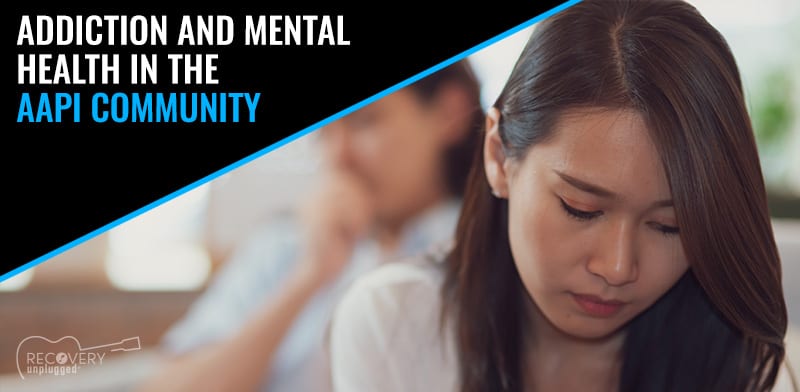Addiction and Mental Health in the AAPI Community

Addiction is a complex and multifaceted issue affecting people from all walks of life, regardless of age, gender, race, ethnicity, or socioeconomic background.
However, addiction can disproportionately impact minority populations, including the Asian American and Pacific Islander (AAPI) community. Although it’s improving, there is a significant lack of awareness and knowledge regarding substance use and addiction for AAPI individuals.
Addiction in the Asain American Pacific Islander Community
Addiction is not a personal choice but a disease that requires individualized care and professional treatment. People with addiction often need ongoing support, even after completing a treatment program.
The AAPI community is hugely diverse, consisting of at least twenty ethnic subgroups. Although national data suggests the AAPI community has low addiction rates, that doesn’t mean it doesn’t exist.
The 2018 National Survey on Drug Use and Health found that 4.8% of Asian Americans have a substance use disorder, yet only 3.3% of those who needed treatment received it.
Individuals in the AAPI community are underrepresented in addiction treatment due to stigma and various barriers such as language, access, awareness, and other cultural and familial obstacles.
Mental Health in the AAPI Community
Similarly to addiction, AAPI individuals face barriers to treatment for mental health conditions. According to the 2019 National Surveys on Drug Use and Health, only 23% of AAPI individuals received treatment for their mental health condition.
Generally, mental health is stigmatized, leading to feelings of shame and isolation and preventing people from seeking help. When this happens, people’s symptoms can worsen, and they may experience a negative impact on their daily lives.
Awareness of warning signs in yourself and others is a great way to break the stigma and increase the likelihood that those who need support will get it.
The American Psychiatric Association lists common warning signs:
- Cognition problems (memory, speech, attention)
- Withdrawal from previously enjoyed activities
- Intense and unexplained emotional shifts
- Significant changes in sleep and eating habits
In addition, The American Psychiatric Association lists warning signs more specific to those in the AAPI community. Since the community is so diverse, not all signs represent each person:
- Faced with or experiences of racism and hate crimes
- Physical symptoms caused by mental health conditions
- The “model minority myth”
- Displacement or immigration trauma
If you or someone you know is experiencing any of these warning signs, it’s crucial to seek help from a mental health professional or contact your primary physician.
Impact of Addiction
The AAPI community is diverse, with various languages, religions, and cultural practices. These differences can impact how addiction is perceived, stigmatized, and treated within the community.
Some cultures may view addiction as a weakness or failure of the person rather than a serious condition that needs attention and treatment.
In addition, there is a lack of representation and resources for those seeking treatment or help with addictions in the AAPI community. Finding culturally responsive and language-accessible treatment options can be challenging, and stigma can affect their likelihood of seeking treatment.
Racism and discrimination related to the COVID-19 epidemic intensified the impact of addiction in the AAPI community—added stress and isolation led to increased substance use, addiction issues, and other mental health challenges.
Similarly, significant psychological distress and racism are linked to drinking problems in Asian American students, according to a 2022 study.
Addiction Stigma and Barriers to Seeking Treatment
AAPI individuals face unique challenges regarding addiction, including cultural obstacles and stigmatization of mental health and addiction.
This can lead to postponing treatment or not seeking treatment at all. As a result, people with addiction can experience worsening symptoms and life-threatening consequences.
It’s crucial to raise awareness and educate the AAPI community about addiction. By increasing understanding, we can work towards breaking down barriers to treatment and providing better support for those struggling in the AAPI community.
Addiction stigma in the AAPI community
Seeing addiction issues as a sign of weakness, feelings of shame and guilt, and denial are all beliefs that further the stigma of addiction in the AAPI community.
Addiction sigma produces adverse outcomes and causes individuals to isolate and avoid the problems they’re dealing with, often delaying treatment or mental health care.
Additionally, AAPI individuals with previous treatment experiences, such as incarceration or institutionalization, may experience increased stigma.
Barriers to treatment for AAPI individuals
Economic
The high cost of addiction treatment and other mental healthcare services is a significant barrier for many people, including AAPI individuals, especially those without insurance or underinsured.
In addition to financial barriers, the lack of access to medical and mental healthcare and knowledge that addiction programs exist for undocumented or non-native English speakers can also make accessing treatment difficult.
Language and Culture
Traditionally, AAPI families care for their own. Because of this expectation, the family will likely attempt to help their loved one instead of seeking professional help.
And in some AAPI cultures, seeking mental healthcare or addiction treatment is considered shameful.
Many addiction treatment programs include group therapy. For non-native English speakers, this may be an added stressor that holds them back from seeking help.
In addition, individuals may be uncomfortable speaking about their feelings or speaking English with others.
Lastly, many medical facilities lack trained providers and professionals to support AAPI individuals’ cultural beliefs and values.
Addressing Addiction
Improving access to affordable and culturally responsive addiction treatment services for AAPI individuals is crucial. Treatment centers and health care providers must prioritize culturally responsive care and linguistically accessible treatment options. In addition, addressing the stigma associated with addiction is essential.
Awareness and implementing strategies to improve care will lead to more support, treatment options, better resources, and increased positive outcomes for those in the AAPI community.
In addition, the AAPI community’s relationship with holistic health practices plays a significant role in addressing addiction issues. Generally speaking, holistic health focuses on the mind-body connection and uses more than talk therapy alone.
Holistic health practices have been used for thousands of years and are recognized as effective treatments for mental health and addiction issues. However, individuals should always seek professional guidance when considering holistic health practices.
Asian American celebrities and mental health
Generally speaking, celebrities who speak out about mental health can positively impact struggling individuals. This is the same for those in the AAPI community.
When AAPI celebrities talk about their struggles with mental health and addiction, it helps break down barriers and stigma. This can make people feel less alone and increase their likelihood of seeking help.
Additionally, AAPI celebrities can increase awareness about the importance of mental health and share resources for those struggling. This can be incredibly impactful for the AAPI community, where mental health issues are not often discussed, or there is a lack of awareness of available resources.
Some AAPI celebrities who have spoken out about their battles with mental health are actors Chase Tang, Margaret Cho, and Constance Wu. The Rose’s frontman Woosung and Bling Empire star Kevin Kreider have also talked about their struggles.
Strategies to address addiction in AAPI Communities
The best way to improve addiction treatment outcomes and increase the likelihood that AAPI individuals will participate in treatment programs is to increase education, provide awareness, and provide culturally appropriate services in treatment programs.
For providers
Providers must acknowledge and educate themselves about their AAPI patients’ cultural beliefs and practices regarding addiction and mental health.
The American Psychiatric Association created a Stress & Trauma Toolkit for physicians and mental health professionals to ensure they provide culturally competent care. The kit lists important terms, assessment and treatment suggestions, and other valuable resources.
Cultural sensitivity in treatment
It’s essential for everyone to feel comfortable while in treatment. This is especially true for those in the AAPI community. Therefore, finding the right program with the right therapists and providers is vital.
Treatment professionals should be trained in cultural sensitivity and best practices when working with individuals in the AAPI community. Consultation with local AAPI experts can significantly benefit providers and improve treatment outcomes for addiction patients.
Bilingual services or translation devices should be available for AAPI patients who request them, as well as alternative programming focusing on support and education.
Lastly, reducing barriers as much as possible is critical to supporting AAPI patients. This could include therapy and addiction and mental health education with the patient’s family.
If you need support
If you or someone you know in the AAPI community is struggling with addiction, seek help as soon as possible. Although there are barriers to care, many resources are available to help.
If you want to help
You can help address addiction in the AAPI community by being an active member of your community and advocating for access to culturally appropriate mental health treatment and resources. Here are some ways you can help:
- Call out and interrupt racism and discrimination when you see it.
- Support your AAPI friends and neighbors.
- Volunteer in your community at events and organizations.
- Advocate for increased funding for mental health and addiction programs.
- Recognize your prejudices, and challenge them when they arise.
- Educate yourself about diversity, equity, and inclusion.
- Reflect on your experiences and the experiences of others.
- Seek out and connect with people who don’t look or sound like you.
- Donate to local community organizations that support the AAPI community.
Last but not least, be kind to others, no matter what. You never know what people have been through or are going through.
We take our music-focused treatment for addiction very seriously, so we are going to hold our content to the same precision standards. Recovery Unplugged’s editorial process involves our editing safeguard and our ideals. Read our Editorial Process.
Sources
American Psychiatric Association. (n.d.). Asian American Community. APA Blogs. Retrieved May 9, 2023, from https://www.psychiatry.org/News-room/APA-Blogs/Asian-American-Community
Ryu, S., & Chaudhuri, S. (2009). Understanding determinants of consumer mobile service satisfaction: An empirical analysis. Journal of Interactive Marketing, 23(3), 209-220. https://journals.sagepub.com/doi/10.1016/j.intmar.2009.04.002
Healthline. (n.d.). Holistic Therapy: What It Is, Types, Benefits, and More. Retrieved May 9, 2023, from https://www.healthline.com/health/mental-health/holistic-therapy
